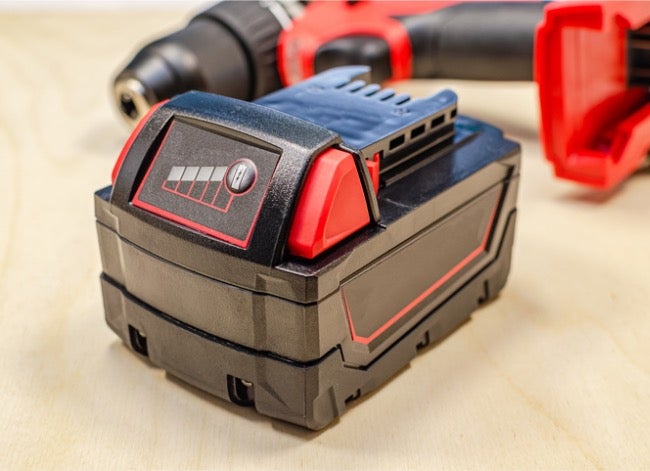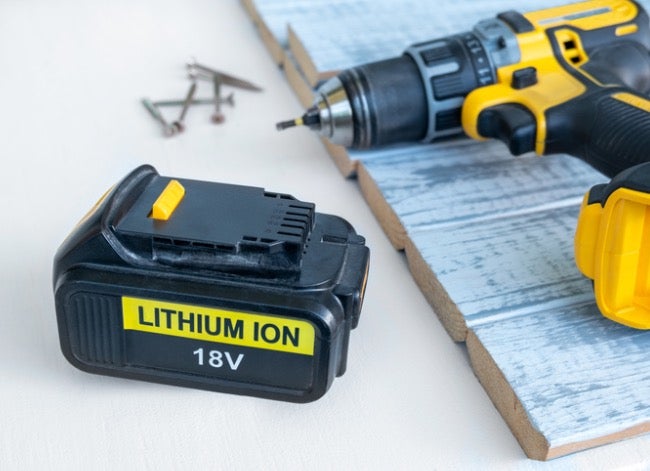If you’re wondering, “do power tool batteries go bad?” you’ve come to the right place. Let’s dive into the world of power tools and their batteries! 💪
Imagine this: you’re working on a project, fired up and ready to go, when suddenly your power tool loses its juice. Frustrating, right? Well, it could be due to a bad battery. But don’t worry, we’re here to answer all your burning questions.
In this article, we’ll explore the lifespan of power tool batteries, signs of a dying battery, and offer tips on how to prolong their life. So, grab your favorite power tool and let’s get started!
Over time, power tool batteries can lose their ability to hold a charge effectively. While power tool batteries don’t necessarily go bad outright, they can become less efficient and hold less power. Factors like usage habits and storage conditions can impact battery lifespan. To maximize the lifespan of your power tool batteries, it’s important to store them properly and follow the manufacturer’s recommendations for charging and maintenance. Regularly checking battery performance and replacing worn-out batteries can help ensure optimal power tool performance.

Do Power Tool Batteries Go Bad? Exploring the Lifespan of Power Tool Batteries
Power tool batteries are essential for any DIY enthusiast or professional carpenter. They provide the necessary power to operate cordless tools, allowing for freedom of movement and convenience on the job site. However, like any other type of battery, power tool batteries have a lifespan and may eventually become less efficient or stop working altogether. In this article, we will delve into whether power tool batteries go bad and explore the factors that can contribute to their lifespan and performance.
Understanding the Lifespan of Power Tool Batteries
Power tool batteries have a finite lifespan, which can vary depending on multiple factors. The most crucial factor in determining the lifespan of a power tool battery is its chemistry. There are three primary types of batteries used in power tools: nickel-cadmium (NiCd), nickel-metal hydride (NiMH), and lithium-ion (Li-ion). Each chemistry has its own advantages and disadvantages, including different charge and discharge cycles.
NiCd batteries, although less common nowadays, are known for their robustness and ability to withstand rough handling and extreme temperatures. However, they suffer from the so-called “memory effect,” which means they gradually lose their maximum charge capacity if not fully drained before recharging.
NiMH batteries are an improvement over NiCd batteries and do not suffer from the memory effect. They have a higher energy density and can last longer between charges. However, they still have a limited lifespan, and their performance can diminish over time.
Li-ion batteries are currently the most widely used in power tools due to their high-energy capacity, lightweight design, and lack of memory effect. These batteries offer a longer lifespan and can provide consistent performance throughout their lifetime.
Factors Affecting the Lifespan of Power Tool Batteries
Several factors can impact the lifespan of power tool batteries, regardless of their chemistry. Here are some of the most important ones to consider:
1. Charge and Discharge Cycles: One of the critical factors that determine battery lifespan is the number of charge and discharge cycles it goes through. Each time a battery is charged and discharged, it undergoes stress that contributes to wear and tear. Therefore, the more cycles a battery goes through, the shorter its overall lifespan will be.
2. Temperature: Extreme temperatures can adversely affect battery performance and lifespan. Cold temperatures can decrease a battery’s capacity, making it less efficient. On the other hand, high temperatures can lead to internal damage and a faster degradation of the battery.
3. Storage Conditions: When not in use, power tool batteries should be stored properly to maintain their performance. Storing batteries in a cool and dry place is crucial to prevent self-discharge and extend their overall lifespan.
4. Maintenance: Proper maintenance can go a long way in prolonging the lifespan of power tool batteries. Regularly cleaning battery terminals, ensuring proper ventilation during charging, and avoiding overcharging or deep discharging can help preserve their performance and extend their lifespan.
It’s important to note that even with optimal care and maintenance, power tool batteries will eventually degrade and reach the end of their lifespan. When that happens, it’s advisable to replace the battery with a new one to ensure safe and efficient operation of power tools.
Other Factors Affecting Power Tool Battery Performance
Battery Age and Usage Frequency
The age of a power tool battery and how frequently it is used can also impact its performance. Over time, the internal components of a battery may wear out, leading to reduced capacity and shorter runtime. Similarly, if a battery is frequently used and subjected to heavy usage, it may experience faster degradation compared to a battery used less often.
Quality and Brand
The quality and brand of power tool batteries can also play a role in their lifespan and performance. Batteries from reputable manufacturers often undergo rigorous testing and quality control measures, ensuring better overall performance and longevity. It’s worth investing in batteries from trusted brands that offer warranty coverage and reliable customer support.
Proper Charging and Storage
Proper charging and storage practices can significantly impact the performance and lifespan of power tool batteries. It’s important to follow the manufacturer’s guidelines for charging, avoiding overcharging or undercharging the battery. Additionally, storing batteries in a cool and dry place when not in use helps prevent self-discharge and extends their overall lifespan.
In conclusion, power tool batteries do have a finite lifespan and can eventually go bad. Factors such as the battery chemistry, charge and discharge cycles, temperature, storage conditions, and maintenance practices can all affect the lifespan and performance of power tool batteries. By understanding these factors and implementing proper care and maintenance, users can maximize the lifespan of their batteries and ensure optimal performance for a longer duration.
Key Takeaways: Do Power Tool Batteries Go Bad?
- Power tool batteries can go bad over time due to various factors.
- Leaving batteries stored for long periods without use can cause them to deteriorate.
- Extreme temperatures can negatively impact battery life and performance.
- Regularly using and charging the batteries helps maintain their health.
- It’s important to follow manufacturer instructions for proper battery care to extend their lifespan.
Frequently Asked Questions
When it comes to power tool batteries, you might be wondering if they can go bad over time. In this section, we’ll answer some common questions related to the lifespan and durability of power tool batteries.
1. What factors can contribute to power tool batteries going bad?
Several factors can affect the lifespan and performance of power tool batteries. One of the main factors is age. Over time, batteries naturally degrade, which can lead to decreased performance. Additionally, extreme temperatures can also impact battery life. Exposure to high heat or freezing conditions can cause the battery to deteriorate faster.
Another significant factor is how the battery is used and maintained. Frequent and heavy use can accelerate battery deterioration. It’s essential to follow the manufacturer’s guidelines for charging, storing, and using the battery to ensure optimal lifespan.
2. Can power tool batteries be revived if they go bad?
Reviving a power tool battery that has gone bad can be challenging. In some cases, it may be possible to restore a battery’s performance by using a process called “reconditioning”. This involves fully discharging and then fully recharging the battery multiple times to help recalibrate its cells. However, reconditioning may not always be successful, and it’s important to note that the procedure can void the warranty on the battery.
If your power tool battery is no longer holding a charge or providing sufficient power, it’s often more cost-effective to replace it rather than attempting to revive it. Reputable power tool manufacturers or authorized service centers can provide guidance on the best course of action for a failing battery.
3. How long do power tool batteries usually last?
The lifespan of power tool batteries can vary depending on several factors. On average, a power tool battery can last anywhere from 1-5 years, depending on the quality of the battery, usage patterns, and how well it’s maintained. Higher-quality batteries often have a longer lifespan compared to cheaper ones.
Factors such as the number of charge cycles, temperature exposure, and storage conditions can also impact the battery’s longevity. It’s important to follow the manufacturer’s guidelines for charging, storing, and maintaining the battery to prolong its lifespan.
4. How can I extend the lifespan of my power tool battery?
To extend the lifespan of your power tool battery, there are several steps you can take. First, avoid overcharging the battery. Overcharging can lead to overheating and reduce the battery’s overall lifespan. It’s recommended to unplug the charger once the battery is fully charged.
Second, avoid storing the battery in extreme temperature conditions. High heat or freezing temperatures can damage the battery cells. Ideally, store your power tool batteries in a cool, dry place.
Lastly, it’s essential to use your power tool battery regularly. Even if you’re not actively using the power tool, it’s recommended to recharge the battery every few months. This helps keep the cells active and prevents them from deteriorating during long periods of inactivity.
5. Are there any signs that indicate a power tool battery is going bad?
Yes, there are some signs that indicate a power tool battery may be going bad. One common indicator is a significant decrease in runtime. If you notice that your power tool battery is not holding a charge as long as it used to, it may be a sign that the battery is deteriorating.
Another sign is reduced power output. If you notice a decrease in the performance of your power tools, such as slower speeds or weaker torque, it could be a result of a failing battery. Additionally, if you see any physical damage or leakage on the battery, it’s a clear indication that the battery needs to be replaced.

How to revive a dead rechargeable power tool battery easily
Summary
Power tool batteries can go bad over time, especially if not properly cared for. Overcharging, extreme temperatures, and long periods of inactivity can all contribute to the deterioration of battery life. It’s important to follow the manufacturer’s recommendations for charging and storing batteries to ensure their longevity.
If you notice your power tool battery isn’t holding a charge or is taking longer to charge, it may be a sign that it’s going bad. It’s best to replace a bad battery rather than attempt to revive it. By taking care of your batteries and replacing them when necessary, you can keep your power tools running smoothly and efficiently.
